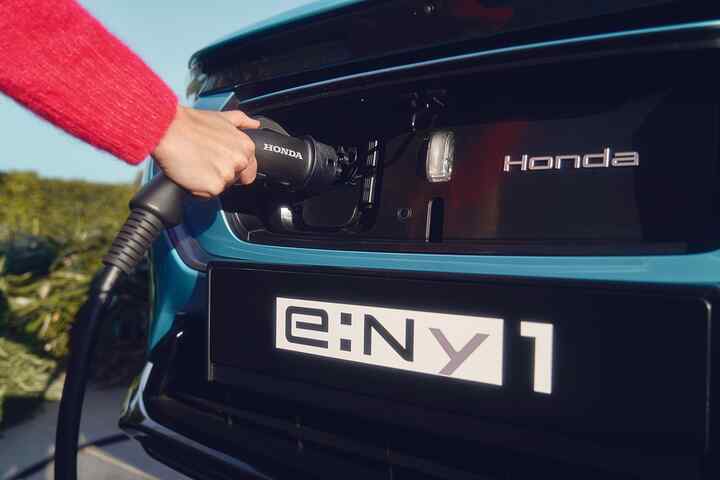
Electric Car Charging at Home
Charging your electric car at home is simple and convenient, and with Honda, it's even easier. Whether you're using a standard wall socket or installing a dedicated EV charger, this guide walks you through everything you need to know.
Let’s explore how you can make the most of home charging for your Honda electric vehicle.
How do you charge an electric car at home?
Before you can charge an electric car at home, you need to think about what method to use. You’ve two options when it comes to electric vehicle home charging points, each with its own benefits and disadvantages.

Dedicated EV charger
A dedicated charging point offers faster charging and is professionally installed, ensuring safety and reliability. It also includes advanced features such as power consumption monitoring and charge scheduling, helping to optimise energy use and lower costs.
Honda’s charging solution, e:PROGRESS, integrates with your home energy setup, ensuring your vehicle is charged in the most efficient and environmentally friendly way, all managed through an intuitive app.
Learn more
Standard wall socket
You can use a traditional, 3-pin, weatherproofed wall socket plug and charge your vehicle from the mains. This is cheaper, but it takes longer to charge your vehicle. These EVSE charging cables are easy to use, but you’ll need to take care when handling them. They work well as a backup but may not be as desirable for day-to-day use.


Charging your e:Ny1
An intelligent charging solution that connects your e:Ny1 with any charger and tariff. Managed in an intuitively smart app, this service charges your Honda in the cheapest and greenest way.
Installing a home charger for your electric vehicle
There are a few things to consider if you’re installing car charging points at home, as they can’t just fit anywhere or be installed by just anyone. You must:
• Find a suitable exterior charge point on your property. Look for somewhere close to where you normally park.
• Contact a recommended charging point installer to safely connect the system.
• Safely connect the electric vehicle home charging points to the main electric supply.
Cost of installing an EV home charger
Chargers can vary in cost, depending on the chosen installer and the type of charger you want to install. Other unforeseen circumstances may need to be considered in some instances. In general, the average cost of installation for an electric car charging point at home can range anywhere from £700 to £1,200.
.jpg/jcr:content/renditions/c4.jpg)
Electric vehicle charger grants and incentives
Depending on your location, government support could be available to partially cover the cost of charger installation. While these can vary, your local government website should contain details about any grants or incentives.
How long does it take to charge an EV from home?
Electric vehicle home charging points can vary in charge time due to their power output, as well as the size of your EV’s battery. Generally, compared to public charge points, electric car charging at home is slower because the chargers aren’t as powerful. Most EV owners charge their vehicles overnight, so they have a full battery the next day. Typically, the average electric car runs with a 60kWh battery – so, a 7kW charging point would take around 8 hours to fully charge your vehicle. However, a public charge point could generate as much as 50kW, charging your vehicle in minutes. So, even if you’re on the road for a long time you won’t be making overnight pitstops.
Can I speed up charging my electric car at home?
It’s possible to speed up your electric car charging at home, and most installers will offer a range of charge point speeds depending on your needs. So, if you’re currently operating with a 3.7kW charging point, you could consider a 7kW or even higher. However, you should be aware of your vehicle’s innate charging time, as some have their charge rates artificially set to prolong and protect the battery life. Each vehicle has its own set charge times, so check with the manufacturer before you make any purchases. Also, while high-power charging points are available, many homes may not be able to support such high voltage on their native electrical supply.
FAQs
Can you plug a car into a regular outlet?
Yes, electric car charging at home can be done by connecting the charger to a regular, 3-pin, wall socket plug. However, charging this way can be much slower than a dedicated charging unit, so it’s best used as a backup unless you are an infrequent driver.
Should I charge my EV every night?
The quick answer to this is no, you don’t need to charge your EV every night. In fact, if you get into the habit of leaving it on charge every night, ironically you can shorten/degrade the lifespan of the car’s battery pack. Just like a phone battery, you don’t want to let it sit at 100% capacity with the charger in for too long. Therefore, it can be better to avoid charging while you’re asleep. Every battery is different, so check your car user manual for the best advice and recommendations on battery charging.
Can you sit in an electric car while it’s charging?
Yes, there’s no immediate risk to the average person if they want to sit in an EV while it’s connected to a charge point. However, it’s advised that people with pacemakers don’t because the charging may disrupt their devices.
Related Reading





